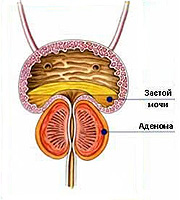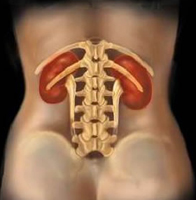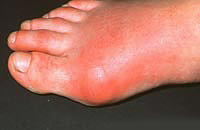Urolithiasis occurs in 0.2-0.8% of pregnant women. However, the kidney stones in this period are usually not formed, urolithiasis in women develops before conception and with the onset of pregnancy only changes its current. At the same time, the urolithiasis and the accompanying pyelonephritis often make adjustments to the state of the woman. About these and other facts in our article.
Content
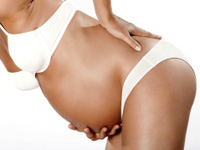 Urolithiasis in pregnant women (Code of ICD 20-23) is found at 0.2-0.8% of cases. This is explained by the fact that urolithiasis is quite common and stones in urinary ways are most often formed precisely in childbearing age. Urolithiasis in a woman waiting for a child can proceed asymptomaticly, but sometimes it is manifested by kidney colic caused by the disorder of small concreters. The pain in the renal colic can stimulate the sensations caused by the contraction of the uterus, which makes it difficult to diagnose urolithiasis. Pyelonephritis, often complicating urolithiasis, represents a threat to a woman and fetus, and contributes to the development of toxicosis, intrauterine infection, premature interruption of pregnancy. What is the mutual influence of pregnancy and urolithiasis?
Urolithiasis in pregnant women (Code of ICD 20-23) is found at 0.2-0.8% of cases. This is explained by the fact that urolithiasis is quite common and stones in urinary ways are most often formed precisely in childbearing age. Urolithiasis in a woman waiting for a child can proceed asymptomaticly, but sometimes it is manifested by kidney colic caused by the disorder of small concreters. The pain in the renal colic can stimulate the sensations caused by the contraction of the uterus, which makes it difficult to diagnose urolithiasis. Pyelonephritis, often complicating urolithiasis, represents a threat to a woman and fetus, and contributes to the development of toxicosis, intrauterine infection, premature interruption of pregnancy. What is the mutual influence of pregnancy and urolithiasis?
- Urolithiasis, the presentation of which can coincide with pregnancy, originates long before conception. Stone formation during pregnancy, despite the high probability of pyelonephritis and urine stas, is extremely rare. Physiological restructuring taking place in the body of a woman during this period contribute to the maintenance of colloidal and crystalloid equilibrium of urine, prevent the deposition of salts and conducive to the removal of precipitate. In addition, the development of urolithiasis in pregnant women prevents the high concentration of silicon in the urine that performs a protective role and maintaining salts in a dissolved state.
- The stream of urolithiasis in a woman during pregnancy deteriorates in 30-40% of cases, the renal colic is observed more often, but it takes place easier, the pain is usually less pronounced, the blood flow in the urine is less common.
- Presentation of urolithiasis (Code of ICD 20-23) in the form of renal colic can really be associated with pregnancy. Particularly observed the destruction of stones in the first 4 months and the last 4 weeks of pregnancy. This is due to a decrease in the tone of kidney pelvis and ureterals, lightweight advancement of counterscents in the underlying urinary tract. In the interval between these deadlies, the infectious complication of the urolithic disease is often detected — pyelonephritis.
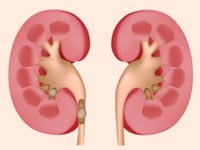 During pregnancy, especially in its first trimester, kidney stones can go spontaneously and painlessly, which contribute to hormonal restructuring and the overall decrease in the nervous tone of urinary tract. After 34 weeks of pregnancy, urolithiasis is rarely accompanied by a latent flow, since ureterals are squeezed with an increased uret. In the postpartum period, the extension of stones resumes.
During pregnancy, especially in its first trimester, kidney stones can go spontaneously and painlessly, which contribute to hormonal restructuring and the overall decrease in the nervous tone of urinary tract. After 34 weeks of pregnancy, urolithiasis is rarely accompanied by a latent flow, since ureterals are squeezed with an increased uret. In the postpartum period, the extension of stones resumes.- Repeated renal colic, complicated urolithiasis, pyelonephritis can cause abortion abortion.
- The use of tocolithics, that is, drugs that reduce the tone of the uterus can provoke the extinguishing of renal concreters during urolithiasis, the presentation of urolithiasis may coincide with the threat of abortion.
- In most cases, urolithic disease uncomplicated by pyelonephritis (Code of ICD 20-23) does not have a significant impact on the development of pregnancy. Spontaneous abortions are rare, the fruit is developing normally, childbirth occur on time. In 15% of cases at urolithiasis, a pregnant woman develops nephropathy or toxicosis of the second half of pregnancy.
- Diagnostics of urolithiasis in pregnant women are held under the general rules, excluding research using X-ray rays, as well as chromocystoscopy.
- During pregnancy, thermal procedures are contraindicated, traditionally used with urolithiasis.
- Treatment of renal colic with urolithiasis (Code of ICD 20-23) is carried out without the use of narcotic analgesics. They can only be used in case of extreme necessity, since they increase the tone of the uterus and oppress the fetal respiratory center.
- The probability of getting sick after childbirth in women with one child, and many times giving birth the same, pregnancy does not increase the risk of development of urolithiasis.
- The presence of urolithiasis and its presentation in the early periods of gestation is not contraindicated to preserve pregnancy except cases with renal failure, which is extremely rare.



